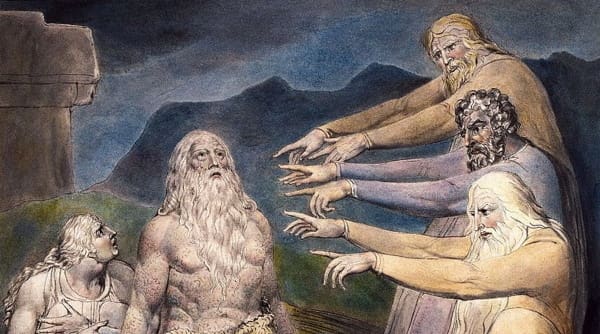What is your reaction when confronted with human heartache?
Do you feel the urge to fix it? To prescribe the right book, the right prayers, the right slogan, or the right regimen? Or maybe you crack a joke to lighten the mood; maybe you put things in perspective with a comparison: “Well, at least you’re not like ____________________.”
Fixing feels good at the time. We tell ourselves that we are “helping” the other person – but we are probably helping ourselves. We don’t like that feeling of heartache, and we definitely don’t like feeling powerless – so we back away from the abyss by trying to fix it.
When Job’s friends arrived, they found him sitting on a pile of dung, scraping at his scabs with a shard of pottery. They sat with him for a time, but couldn’t abide his heartache for very long. They shifted to analyzing and fixing and thereby abandoned him in his pain. Indeed, they blamed him for it!
Giving advice is easy – and not nearly so helpful as we like to think. In some cases, it is our way of backing away from solidarity with the suffering person. In others, it is an arrogant way of saying, “If only you were more like me, your problems would go away.”
I have noticed that subtle message in myself and others – both at the individual and the collective level. I think of Casa Hogar Juan Pablo II – an orphanage in Peru founded by Fr. Joe Walijewski, a saintly priest from our diocese. I have been there five times, usually with a group of young people. The thought process at home is almost always the same – Isn’t it great that we are sending down some of our youth to go and help those poor people? We assume that our affluent American ways are better than theirs. We assume that we have the power, wisdom, and resources to solve their problems. If only they were more like us…
Fr. Walijewski actually saw it the other way around, dreaming of a “mission in reverse.” The mission is not our people going down to Peru. Rather, we go to Peru so that the children there can teach us what it means to be human!
And they have taught us – every time. Amidst material poverty, amidst government corruption, amidst heart-wrenching stories of loss or betrayal, we have encountered stunning beauty and joy. It exposes our own deeper poverty – what Mother Teresa called “the poverty of affluence.” Every single trip I have witnessed the shocked realization in our youths’ faces and tears: How can children possessing so little, children who have suffered so much, be so joyful? How can they love so tenderly and so vulnerably? How can we who possess so much be so joyless?
Jesus invites us to be with each other in communion – both in the agonizing sorrows of life and in the intense joys. As Paul puts it, “Rejoice with those who rejoice; weep with those who weep” (Romans 12:15). That means that the human heart of a saint is never far from tears and never far from laughter. Those who are the most open to tears are also the most capable of joy. That is because, in the Paschal Mystery, Jesus has redeemed human heartache by investing meaning into it. He invites us, not to bypass suffering and the Cross, but to follow him through it to new and abundant life – to follow where the brave Shepherd has gone before.
It is only when we face the fuller depths of our humanity – in all its beauty and brokenness – that we can die with Christ and rise with him.
It is in such human encounters that the newness of the Resurrection breaks in. Those who learn to abide in the midst of heartache, staying vulnerable and receptive to God and others, will experience the surprise of the Resurrection and the joy of the Gospel. Jesus assures us that his Father blesses those who are poor, those who grieve and mourn, those who are willing to be vulnerable, those who hunger and thirst. Facing heartache allows us to receive the Father’s blessing. “Fixing” it closes us off and diminishes our receptivity.
Let’s face it – facing heartache is hard! As the great poet T.S. Eliot put it, “Humankind cannot bear very much reality.”
I think that is why, when Jesus died on Good Friday, he said “Behold – your mother!” – not just to John, but to every beloved disciple. Mary was often in situations in which she intuitively understood that God was doing amazing things. She did not at all know how it was going to be okay. I am thinking of the Annunciation, Jesus’ birth in a stable, the flight into Egypt, the cryptic words of Simeon in the Temple, the losing and finding of 12-year-old Jesus in Jerusalem, his torture and execution, and the awful watching and waiting on Holy Saturday. Again and again, mother Mary faced heartache. Again and again, she waited with expectant hope and was surprised by the marvels of the Kingdom of God.
The last time the Bible tells us about Mary is in Acts 1. Following Jesus’ Ascension into heaven, yet again she abides in uncertainty and messiness. She prays with the apostles every day in the cenacle – nine days in all. It took those apostles many years and many failed attempts, but they learned to abide and receive. The Jewish feast of Pentecost arrives – the day to bring first fruits of the harvest to God. In a stunning and joy-filled reversal, God gives the first fruits to his Church in the person of the Holy Spirit. Mary recedes, and the early Church comes to birth, set on fire with the Holy Spirit.
The Church is intended by God to be a community that faces heartache vulnerably, open to the Father in holy receptivity and open to each other in true communal fellowship. Rather than trying to fix or advise others so that their story can fit into the preconceived mold of our own story, we expect the Holy Spirit to show up. We expect the Father’s blessing. We expect that the new life of Resurrection will surprise us. Fixing is too constrictive to allow space for God to do his work.
Do we have the courage to face our humanity together, and to abide together in Hope?
Image: William Blake, Public domain, via Wikimedia Commons.




